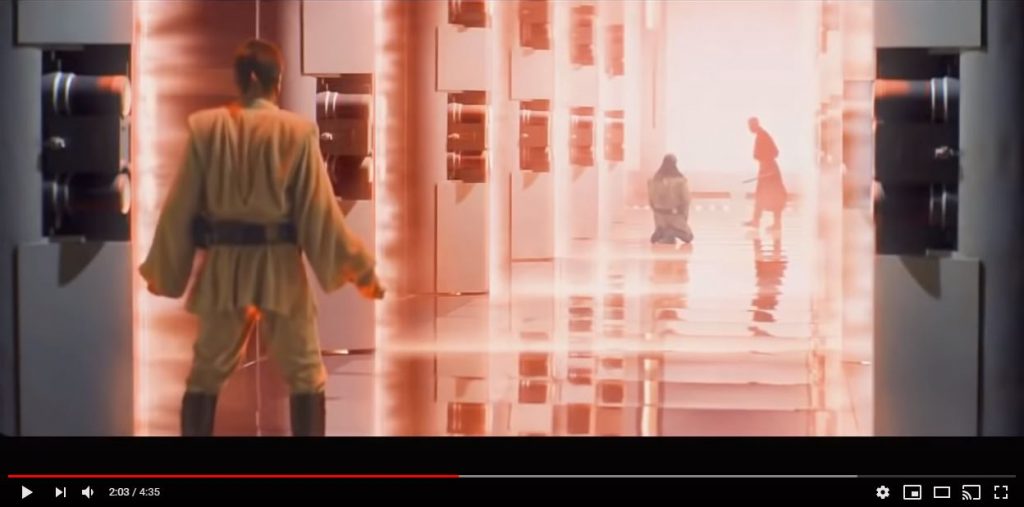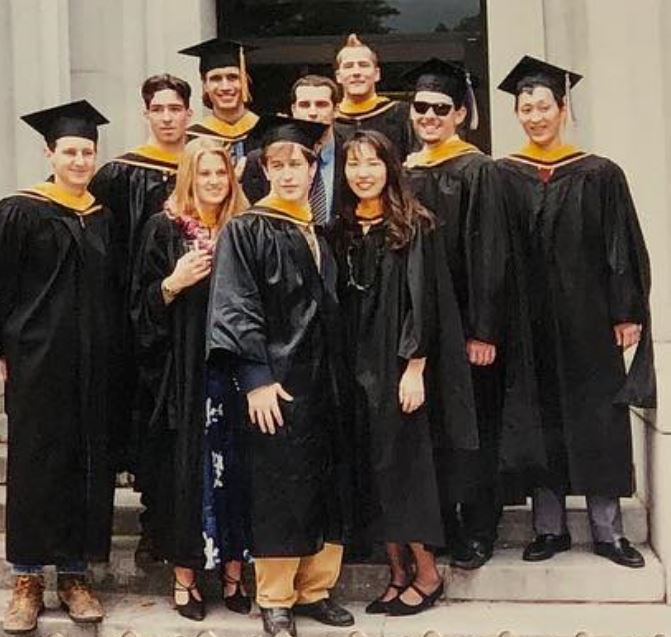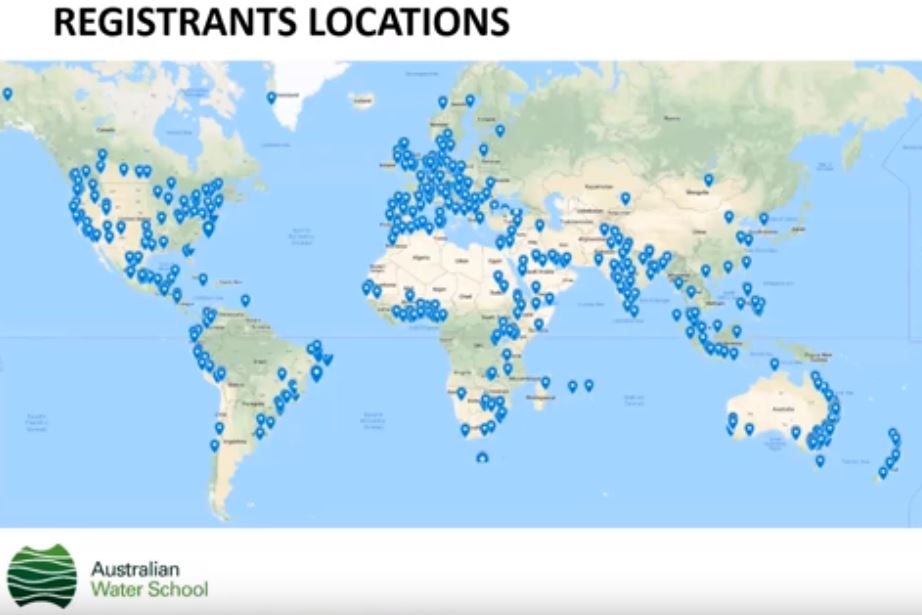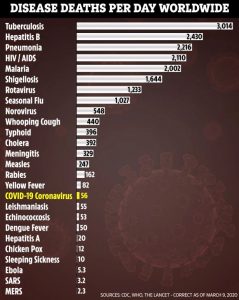The Parable of Darth Covidious
by Krey Price
Easter 2020
With everyone confined to their homes this Easter, it looks like the churches will be empty; I think that means we’re all free to make up our own sermons and parables this year. That said, here’s mine: “The fight against coronavirus is like unto the Battle of Naboo…”
How’s that?
Well, we recently kicked off a lock-down Star Wars marathon in our house. Now I know full well that Episode I gets a lot of well-deserved flak; but one Jar-Jar-less scene in particular seems very fitting under the current circumstances:
When Qui-Gon and Obi-Wan face Darth Maul, their pursuit is interrupted by a force field that temporarily locks them inside individual chambers. When Qui-Gon realizes there is nothing he can do but wait, he drops to his knees to prepare himself for the battle ahead. By the time the force field deactivates, his preparation is done; he jumps straight to his feet and is ready to strike. Sure, Qui-Gon ends up getting his ass kicked, but that just fuels the fire inside of Obi-Wan, who prepares for the inevitable duel in his own way during his seclusion: bouncing from foot to foot and shaking his arms like a fighter in his corner getting ready for the bell. The instant the force field drops, he mounts a full-on attack with his lightsaber blazing and ends up finishing off the Mauler. Here’s a clip of the duel, which in my opinion is the highlight of the entire prequel trilogy:
So what does this all have to do with us?
Well, our daily battles have been temporarily interrupted, and we’re all stuck at home for the time being. There is a deadly threat outside our walls (hey, in the parable version he even looks like the virus!) When social distancing orders are eventually rescinded and the doors open again, the “menace” will still be there – hopefully retreating, but still posing a threat. By that time, a collapsing economy may be threatening more lives than the virus itself; whatever the case, we will all need to be ready to hit the ground running to face down the overall threat.
So what can we do about it now, while we’re trapped inside our chambers like the two Jedi knights?
~~~~~~~~~~
One way is to drop to our knees like Qui-Gon. I don’t know what would have been going through his mind while he was kneeling in meditation; I imagine he would be trying to get himself in tune with the force to allow his next steps to be guided by his predecessors. He looks to be drawing on its power, but I doubt he would have been asking or expecting the force to simply solve his problem for him.
A number of different religions are unifying in prayer and fasting over this Easter Weekend, hoping to help eradicate the threat of the virus with a show of unity and supplication. The ways in which those who participate in the effort seek to connect with the universe and with each other are bound to be as varied as humanity itself, but I imagine many of us will be asking “the force” to help guide the hands of doctors, politicians, key decision-makers, and everyday people rather than expecting the problems to simply disappear without extraordinary human effort. Whatever form the prayers take, in the end, I would hope that the effort results in a collective resolve to “bear ye one another’s burdens,” as the verse goes.
~~~~~~~~~~
Another way is to prepare ourselves physically, warming up for the fight like Obi-Wan. He still had to rely on the force to support his last ditch effort, but the rest of the fight required him to dig deeply into his own training. I’ll make a plug for online training later, but whatever your trade, use the downtime to hone your skills!
And if the loss of someone or something that is important to you helps motivate you like Obi-Wan, draw on that motivation to come out with your own lightsaber blazing! Many have been physically affected or have lost loved ones to the virus itself. Some have been trapped within their home’s walls while family members passed away in confinement elsewhere and were even unable to hold funerals – perhaps feeling the type of helplessness depicted in the Star Wars parable when Obi-Wan watches his friend and mentor succumb to the Sith while confined himself.
In a less direct but much more prevalent scene, plenty of people are getting their financial asses kicked by the fallout from this virus. I may well join their ranks if my own contracts get canceled; we are all equally vulnerable to the unpredictable chain reactions of a disruption to the supply chain. Whatever potential loss you or your loved ones may face, getting in touch with your own Obi-Wan-style rage and resilience and determination could help make the response to the crisis that much more effective.
~~~~~~~~~~
In the end, Obi-Wan and Qui-Gon had different and equally valid styles of preparing for the fight, but neither one of them sat around playing Candy Crush while waiting for the doors to open!
So…what can we do in the meantime while we’re in lock-down?
This is just one idea, but here’s my social media challenge: Find an old photo, pick a day and time, and try to get everyone in the photo together on Zoom/Skype/Webex/Messenger. We just did this with the U.C. Berkeley hydraulics department’s Class of ’96 graduation photo below.
I tried to track down every classmate in the photo on LinkedIn, sent them a Zoom link, and asked them to forward to the others in their contact lists. As much as people hate online meetings these days, I wasn’t sure anyone else would join the call. But when the time came, I was thrilled to see faces and hear stories from former classmates I hadn’t spoken to in over 20 years. Without our online reunion, I probably would have let another 20 years go by without contact, in which case we’d all be retiring and unable to make much of a difference in each other’s careers. Instead, we were able to connect and discover what we’ve shared in common and what has been unique to our journeys in terms of family, work, and other aspects of life.
This is not just about catching up with old friends, as fun as that was to do. This is not just about asking RUOK?, as important as that question is during this time of isolation. What I also realized from our call is that our shared background puts us in a distinct position to make a difference in each other’s lives. When I look at the photo, I know I for one didn’t have the slightest clue about the real challenges of an engineering career at the time. None of us had a job lined up on graduation day, so we were all in the same boat. During our reunion call, though, we each realized we could trace our first jobs back to each other; there was a chain reaction in which we took care of one another and passed along connections until everyone had been hired.
Despite the elapsed time, we still share the same connection. But now we’re real engineers with real jobs. And real families and real employees who face real threats in a shrinking economy. Perhaps we are much more experienced now, but we are also much more vulnerable given what’s at stake, and we could find ourselves much more in need of each other’s help in an uncertain future. When I look at other photos of us goofing around in the hydraulics lab or at campus parties, it’s still hard to picture each other having real responsibilities nowadays, but the clueless undergrad whose shoddy papers you once graded might have gained a clue in the meantime and might be running a company that could now save your hide in a downturn (true story!)
This lock-down gives us a once-in-a-lifetime (hopefully) opportunity where nobody has an excuse to miss the call,so I think I’ll keep the challenge going with other photos of coworkers, classmates, and friends. Who are we kidding, we’re all available! If you’d rather bow out because you hate online chats and would prefer to meet face to face, I’d have to agree. That’s my preference, too. Yes, wouldn’t it be fun to sit down together in person and share some drinks reminiscing about the past? Sure! But the reality is that even in a vibrant economy without travel restrictions, that’s never going to happen with a group like ours that is scattered around the world. From where I sit – in a part of Australia that’s isolated even on a good, non-pandemic day – the preference for in-person contact is no reason to throw out the online re-connection as the next best thing.
Re-establishing personal and professional connections is just one idea of how to hit the ground running when that door opens. Armed with those connections, we may be in a better position to respond to future crises, even if our respective skill sets have nothing to do with disease control. My own technical background, for example, gives me no aptitude whatsoever with which I could help combat the threat of the virus directly. But those who do have the skills to fight the virus need funds to do so. And those funds will evaporate if the economy collapses. Every part of the economy needs to function for the trickle-down effect to reach the most vulnerable populations. Developed nations will need their economies intact to be able to be of any use whatsoever to some nations that will surely lack adequate defenses as the virus rages through refugee camps, shanties, and other areas with no hospitals to speak of, let along respirators and face masks.
So this brings me back to up-skilling with online training: Here at Surface Water Solutions, we’re putting free resources online for those who wish to gain water modeling and related experience, including live webinars where you can ask real-time questions about free hydrological and hydraulic software and open-source geospatial programs like QGIS. Why do this for free? Well, not only does the information exchange improve our collective ability to solve problems, but it also provides us individually with mutual connections. And you never know when someone you connect with will be able to help you out, and vice versa.
In some of our webinars, for example, we have had over 1,000 people from all around the world tune in and participate in the discussion. When I look at our registration maps, it gives me a bit of an epiphany: I see so many different backgrounds, and I realize that every participant is just wanting to figure out how to get water where it’s needed, and keep it away from where it might cause harm. There are no barriers based on politics, race, religion, or nationality – no spin, no ulterior agendas, just everyone trying their best to figure out how water moves. Whether it’s recorded videos or live online sessions, these resources are freely available to everyone on the planet with an internet connection. They’re freely available while the force fields are up, so why not take advantage of them now in order to be better prepared when the shields drop?
Sure, take some downtime for yourself and for your family; we could all use a sabbatical! I just spent part of my precious internment time watching Jar-Jar, after all, so I certainly have no place offering advice about spending time efficiently. But even so, let’s have a plan of attack to get things cranking again so we’ll be in a better position to help bear one another’s burdens going forward.
Yes, the churches will be empty this Easter, but I have a feeling that our collective supplication will be unmatched, however it is expressed. Go ahead and drop to your knees this weekend and call on whatever force you believe in to help. Or jump around on your feet and warm up for the coming fight. Either way, when that door opens, hopefully we’ll all be in a position to come out with our lightsabers blazing, united in an effort to face down a common enemy and ready to make a difference in the new world that awaits us.
Whether our respective lock-downs last weeks or months, we’ve all got some time to reflect on lessons learned while we wait for the curve to peak. Next time around, for instance, let’s do it without the partisan politics and nationalistic undercutting. There’s really only one answer here, and it doesn’t fall along party lines: “We’re going to have to science the sh*t out of this” as Matt Damon so eloquently reminded us of in the Martian:
It is disappointing to realize that in response to this crisis, there are people who stared unarguable statistics in the face and made blatantly false projections about the trajectories in order to suit their own agendas and fuel their pep rallies. Lessons that had already been learned had to be re-learned the hard way as unilateral interests trumped traceable trends and resulted in the xenophobic dismissal of effective strategies that had been implemented elsewhere.
Keep in mind, these are the same people who continue to say the planet will be just fine if we drop our environmental safeguards, even when every scientific discipline has long since arrived at the opposite consensus. During future phases of this crisis, we are going to hear people say, “F*ck the Endangered Species Act, let’s get the economy cranking!” The same sentiment will be expressed about the Clean Water Act, the Clean Air Act, Kyoto, Ramsar, and everything in between.
Now I’m all for streamlining red tape, but I’ve also been around long enough to mistrust those who disregard science. In my particular discipline, if physics tells me a flood wave is going to hit a community, and then some politician without the slightest clue on the subject says we’ll all be fine and no flood mitigation measures are needed, then there’s something else up their sleeve. In the COVID case, some politicians initially overrode the experts in their respective disciplines of epidemiology and disease control, dismissing their projections and completely ignoring the underlying science. Isn’t the action verb – or rather the in-action verb – “to ignore” the basis of the term ignorance?
Well, ignorance is one of the enemies we all have a civic duty to fight in this little parable. It is encouraging to see the public willingness to take an economic hit in the form of the current mitigation measures, but it is bizarre that in many cases, private companies with much to lose led the way in keeping their people home long before some governors, premiers, ministers, and presidents got the picture. The delayed reaction in some cases seems to have resulted from deliberate ignorance, which we should perhaps call “ignore-ment” of the facts. Let’s hope that changes in the future, that we can trust elected leaders to actually lead the way, and that we can let the experts speak for themselves without agenda-driven intervention.
I’ve been seeing recent social media posts citing the millions of annual deaths from malaria, cholera, diarrhea, and other causes as evidence that society is overreacting to this one little virus. I for one don’t buy it. Without the scale of the current reaction in the form of lock-down mitigation measures, the “do-nothing” death toll of this virus could easily have rivaled that of waterborne diseases and other much more prevalent killers. We’ve now seen how our collective efforts can help curb the impacts of a deadly crisis, in this case hopefully ensuring that the COVID-19 death toll will be orders of magnitude lower than other casualties we choose to live with every year. But the global response also highlights the fact that we are most certainly underreacting to these other threats; imagine the difference we could make if we approached waterborne diseases with the same fortitude as the fight against coronavirus!
Well, that’s my Easter sermon, complete with a little political (or rather anti-political) rant: In short, Darth Covidious is lurking outside our walls in various forms, and our imposed isolation gives us a singular chance to prepare for the fight ahead. If nothing else, take the chance to reconnect with former colleagues, classmates, family, and friends in any way we can: with so many people struggling during this time, let’s bump RUOK Day up by a few months, and at least ask the question!
With all of my face-to-face courses canceled worldwide, all I can offer from home for now is online training and consulting related to my little piece of the puzzle: predicting the movement of water, which – funny enough – can look very similar to the effects of a virus as you can see here:
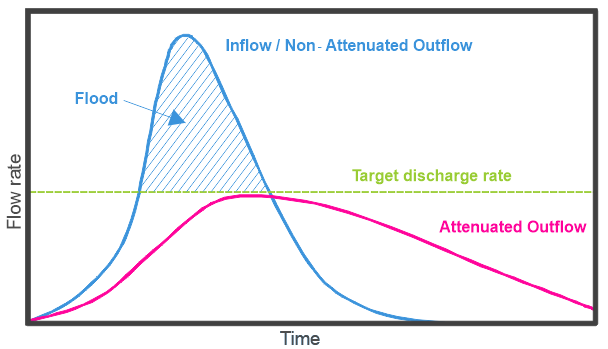 Science is science, after all! [Read more about it in our previous blog post: Attenuate the peak!]
Science is science, after all! [Read more about it in our previous blog post: Attenuate the peak!]
Feel free to contact us for further links and resources or subscribe if you’re interested in helping to literally science the sh*t out of water (Pun absolutely intended!)

